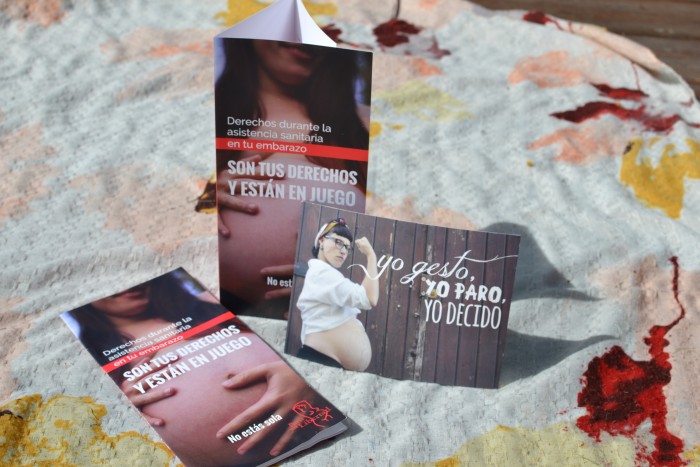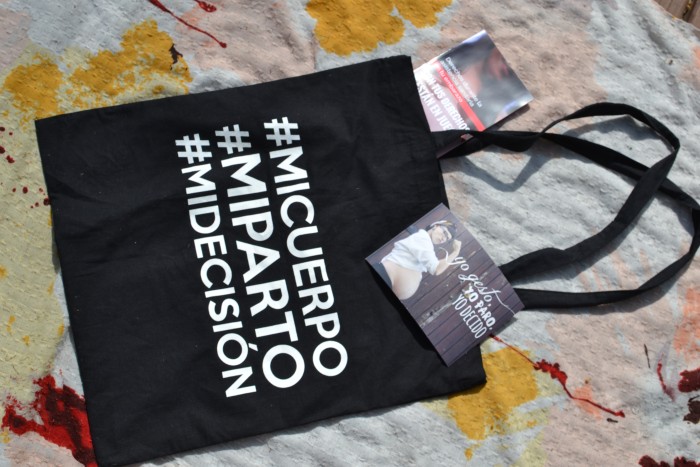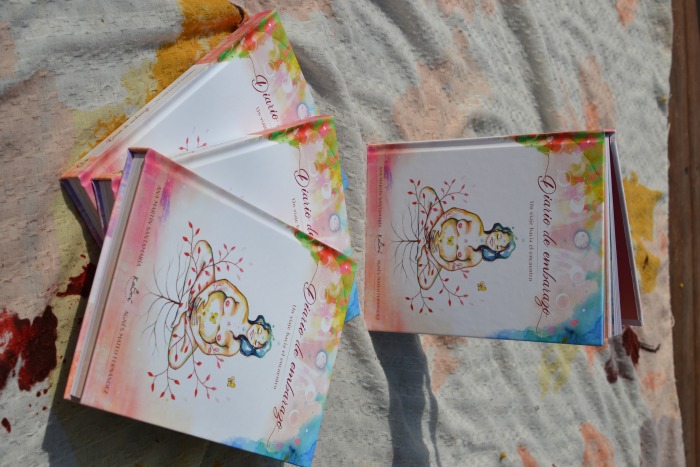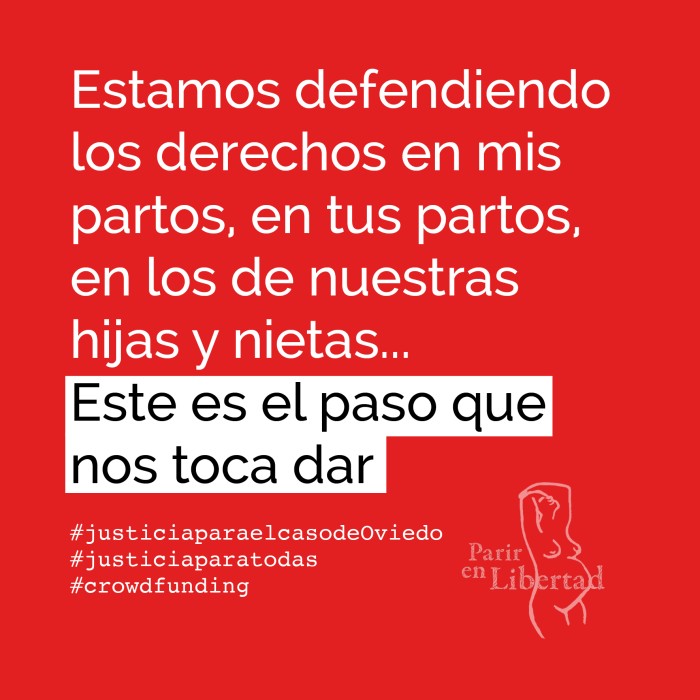Remembering what happened
In a world of obstetric atrocities, the Oviedo case has already become famous. A woman decided to give birth at home, she was well informed and had hired a team of qualified staff to accompany her. As her pregnancy lengthened, she decided to go to the hospital in order to check that everything was going well and, hence, decide whether to continue with the home birth or opt for a hospital birth. That day, two things happened: On the one hand, she verifies that both she and her baby are perfectly fine. On the other, she found herself faced with the arrogance and prejudices of an obstetrician about home birth and women’s individual freedom to decide for themselves. Despite the fact that everything was fine regarding the woman’s and baby’s health, said obstetrician decided to force the former to do what he wanted, with the help of a judge.
From there began a series of failures within the public health system as well as the judicial system. Passing the buck from one to the other, both supported this decision and neither of them faced any consequences. After talking to the obstetrician and him refusing to give the woman a copy of the medical reports and the results of the tests carried out that day, she contacted her private midwife in order to ask for the opinion of another health professional. After this call, the patient returned to the obstetrician’s office and found that the service had been closed. There was no one left to communicate her decision to carry out the home birth to, so she and her partner returned to their home, where sporadic contractions started.
That same night, she went into labour spontaneously at home. The next day, when she was in her labour pool accompanied by her midwife, the police broke into her house. They had a court order to forcefully transfer her to the Central Hospital, where she was to be forced into a labour induction. This medical intervention is pointless when labour has already started. Even more so when neither the mother nor the baby are in danger, as the accompanying midwife had corroborated by monitoring. What doctors wanted was to set this woman behind invisible bars. After three days of kidnapping and constant mistreatment, the baby was born by caesarean section. The c-section was one of the many unnecessary consequences of what happened, which made it impossible for the labour to progress as it would have done naturally and in freedom.
Elitist Justice
This is already the third crowdfunding that we have carried out, from “Parir En Libertad” (“Give Birth in Freedom”, https://www.parirenlibertad.org/). The goal is to pay for the legal expenses of this case. Our intention is not that of compensating a tiny part of the damage generated, for this is not possible: money does not erase trauma, nor does it return stolen experiences. Our aim is that, when such abuse happens again, the woman who experiences it can, at least, defend herself with the trial that we expect to finally win. Because, although in Spain obstetricians and the health system deny that obstetric violence exists – like a lying rapist –, at the UN this issue has precedents and consideration.
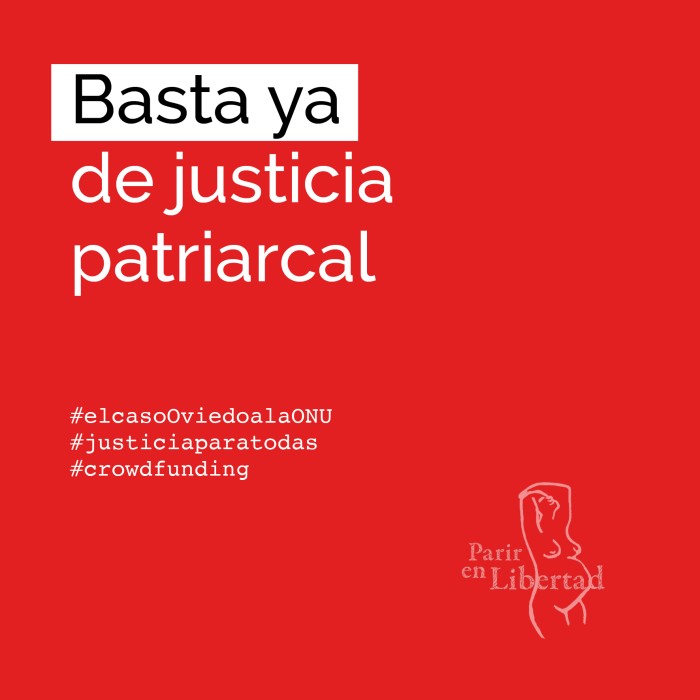
For now, counting the contributions by our families and the sum raised in the previous crowdfunding, we have reached the dizzying sum of about €30,000 in expenses. So far, we have only seen a pantomime: justice, boasting of protecting the citicen, defends the wolves that attack us. And meanwhile, the machine continues to gobble up money so that the judges look the other way, deny the undeniable, and real justice is still missing. But we have arrived at a decisive point, that is getting to the Committee for the Elimination of Discrimination Against Women (CEDAW), where these issues can be dealt with sensibly.
As you can see, justice, without your support, is unreachable. We make, hence, this third appeal, and this time I decide to do it myself, showing my face, telling you my experience, narrating the facts in the first person. Certainly, and luckily, I still have a whole team around me that supports me. I have always been present in the previous crowdfunding, but always kept my anonymity. Enough of hiding.
Evolution of trials and sentences
Today, 4 years after the events, I have exhausted all the national judicial resources. I have taken two lawsuits to the Constitutional Court which have ended in sentences against me. There have also been several votes in my support, though.
The first appeal is against the judicial action that has taken away my right to decide without checking the facts. According to the existing protocols in Spain, before issuing such a court order, I should have been contacted, it should have been verified that no one was in danger. In case of doubt whether the baby’s life was at risk or not, the opinion of another health professional should have been requested. This hell of a situation would have been avoided. This appeal received a negative ruling from the Constitutional Court in June 2022. This ruling sets a serious precedent in Spain by stating that, if you are pregnant, your rights and your decisions do not matter: if a doctor says that the life of your baby is in danger, you lose everything. It doesn’t have to be really in danger, no. It is enough for them to say it, they do not have to prove it and, in fact, even if you prove contrary, it does not matter: the doctor’s word is the law, and your rights, a dead letter. For this first process, one of my lawyers carried out a crowdfunding on her own last year (https://www.franciscafernandezguillen.com/el-caso-oviedo-la-mujer-embarazada-como-contenedor-de-bebes/). Although I don’t remember the exact figure, it seems to me that she managed to raise another €6,000 to allow us to go ahead and take this resource to Strasbourg and, if necessary, to the UN.
The second appeal, against the hospital’s actions during my forced admission, also received a negative ruling in March 2023. When I read the ruling, I didn’t know whether to laugh or cry: It consisted of, basically, 86 pages in which it was stated that if the Central Hospital staff had not write it down in my medical history, there was no evidence of obstetric violence. It’s outrageous. In addition to being an extremely absurd reasoning, the dice had been loaded: the testimonies and expert opinions that we had provided had been ignored. They were not even mentioned, as if they didn’t exist at all. All the credit was given to the word of the defendant and both the plaintiff (in this case, the victim) and the evidence provided were ignored. This evidences the system’s prejudices and bias. Many guilty parties don’t acknowledge the facts in their trials, they don’t leave written evidence of their actions, yet that doesn’t mean that they cannot be pleaded guilty. However, when the defendant is a doctor accused of obstetric violence, everything seems to be different. We are currently raising money for this second process. Our goal is to be able to take it to the UN, to the Committee for the Elimination of Discrimination against Women, and to recognize, once again, the existence of obstetric violence in Spain. We want to assert our rights, as women, also in delivery rooms.
We knew that this could happen. We could not imagine, however, that the outcome would be so shameless nor that it would entail such an economic cost and emotional exhaustion. But not everything is lost since in both sentences there are some particular votes in my favour, very promising ones. Although they are a minority, there are magistrates who have done their job correctly and they understand that what we are denouncing is legitimate and should not be further allowed.
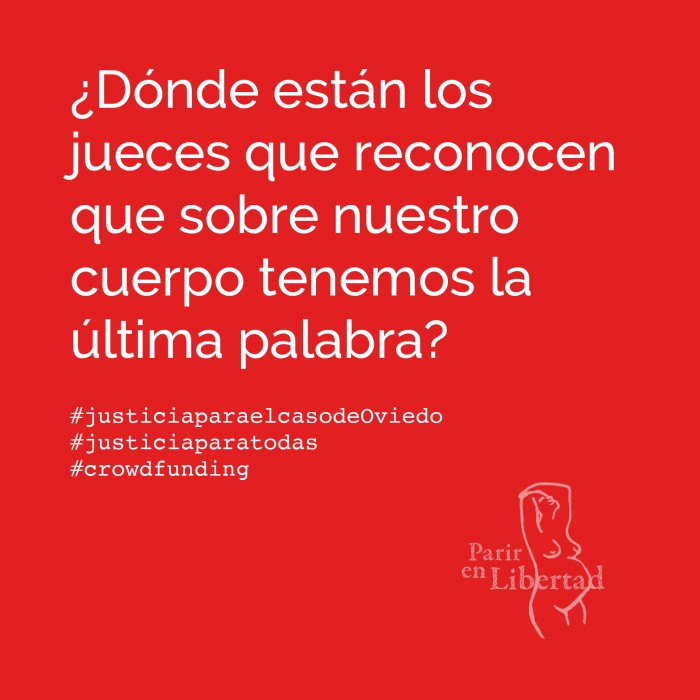
Inmaculada Montalbán Huertas, magistrate and vice-president of the Constitutional Court, is particularly critical of the fact that I was able to give my informed consent and the lack of rigor of the Constitutional Court regarding the study of my claim. This can be noted in the following fragments of her dissenting opinion in this last trial:
“The coercive factual context, in which the plaintiff found herself, prevents the consent given to medical treatment from being classified as free and conscious. The consent is obtained after the threatening information that she was obliged, by court order, to follow the hospital protocols. The only choice they offered her was to resignedly submit to the medical procedures that were proposed to her, or not accept them and wait until there really was no other possible choice but to endure their forced practice. This does not constitute a true consent. The important thing, at the level of constitutional protection, is that she could give free consent.
The analysis of concurrent circumstances is even more necessary when constitutional issues refer to the process of pregnancy, childbirth, and maternity, which is an event of the utmost importance in a woman’s affective and sexual life. The function of guarantor of fundamental rights that corresponds to this Court requires a complete factual and legal constitutional analysis and not fractional or partial. The Court should have verified the clinical history and the psychiatric expert report issued by a Graduate in Medicine and Surgery, Specialist in Psychiatry in order to form criteria of the set of circumstances surrounding the provision of the plaintiff’s consent. According to the conclusions of the specialist in psychiatry, the plaintiff has postpartum Post-Traumatic Stress Disorder, triggered by the treatment received during the birth of her daughter in the hospital. Being subjected to a forced admission is considered as a more than sufficient criterion of acute stressor. That the patient refused a vaginal examination given her history as a victim of sexual violence and that this refusal was not respected is especially traumatic and harmful for the patient, who thus sees her dignity and ability to trust health professionals in the future damaged, in addition detrimental to the progress of labour. The institutional-health action that was carried out on the plaintiff violated her fundamental rights to physical and moral integrity (art. 1 5 of the Spanish Constitution (SC)) and personal privacy (art. 1 8 SC). These rights were completely precluded from the protection of the life and integrity of the unborn, to the point of being emptied of content. This also constituted discrimination based on sex – prohibited by art. 1 4 SC – in terms of degrading and pejorative treatment given to a person for a fact – maternity and childbirth directly linked to the female sex –”
On the other hand, Judge María Luisa Balaguer Callejón expresses in her particular opinion the manner in which obstetric violence was exercised, and how those responsible are being supported by a judicial system that turns a blind eye, avoids sensitive issues, and is based in prejudices:
“The pronouncement that resolves the present writ of protection starts from the existence of an initial situation that does not harm rights, and is limited to analysing the medical actions that followed that admission, ignoring the circumstances in which it occurred. The impact that such circumstances could have on the physical and moral integrity of the appellant. The reasoning is excessively formalistic and does not take into account either the conditions in which hospital admission occurs, or the notion of obstetric violence. Despite that the issue is noted by the parties and although an international document is cited in this regard, it is not considered when resolving the writ of protection.
*The birth process had previously started naturally, which made the justification for judicial intervention disappear, this is the indication to induce labour artificially. It is clear that the decisions of the pregnant woman regarding the development of childbirth and her physical integrity, the management of her own childbirth process, on her body, were absolutely subordinated throughout the process, to the preservation of the interest identified as superior. The judicial body does not take into consideration, with a minimum of reasonableness, the possibility that there are disparate medical criteria on the management of childbirth.”**
And now that? Where do we want to go? What is our goal?
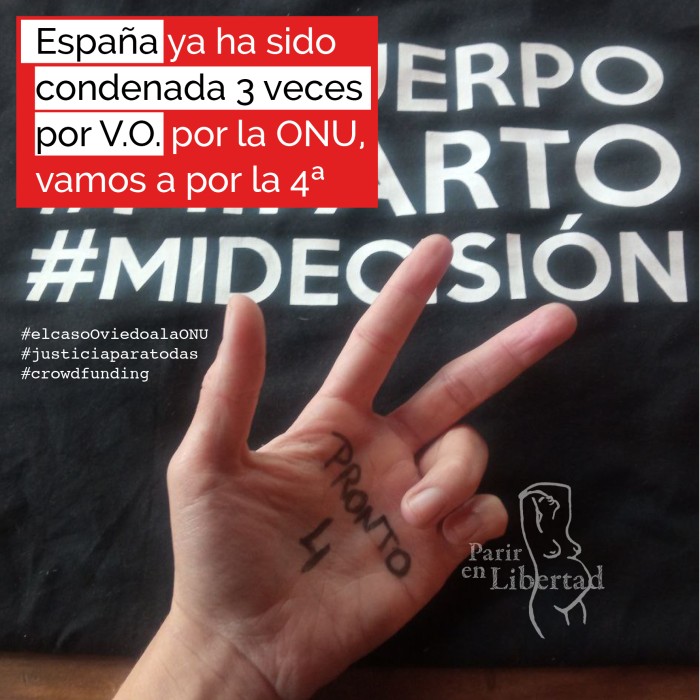
From those dissenting votes, we know that we are very close to winning this legal battle. Also because, although we know that the Constitutional Court is quite conservative, that is not the case at the UN, where there already exist favourable sentences in similar cases. There they would not dare state that forcing a woman to have a stranger perform her examinations by force, under duress and threat is not a form of obstetric violence. Moreover when the said woman had previously explained her refusal for having suffered sexual abuse and offered another person, qualified and collegiate, of her trust to perform the examination in question;
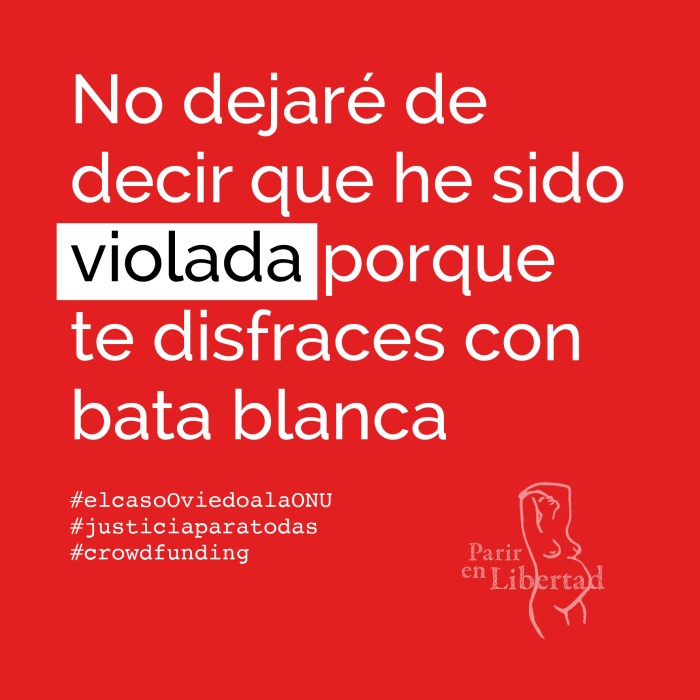
I signed under duress for an epidural, for an artificial rupture of the bag, for continuous monitoring, for morphine, for endless things that I knew that I didn’t want. And I suffered all their consequences: from so much intervening, from forcing something against the clock and in such a hostile environment, I ended up exhausting myself. The labour could not progress amid taunts, threats, and constant coercion. The total lack of privacy, a hostile territory, and endless interruptions hindered it. Although at home I was progressing perfectly, there I couldn’t anymore. Also, my daughter began to show signs that she needed to be born. There was no real urgency, there was no imminent danger, but I already understood that, under these conditions, I was not going to be able to give birth. Therefore, I had no choice but to end up in a c-section section, with general anaesthesia and postpartum separation. I fell on the trap. Because this is what it is: a trap.
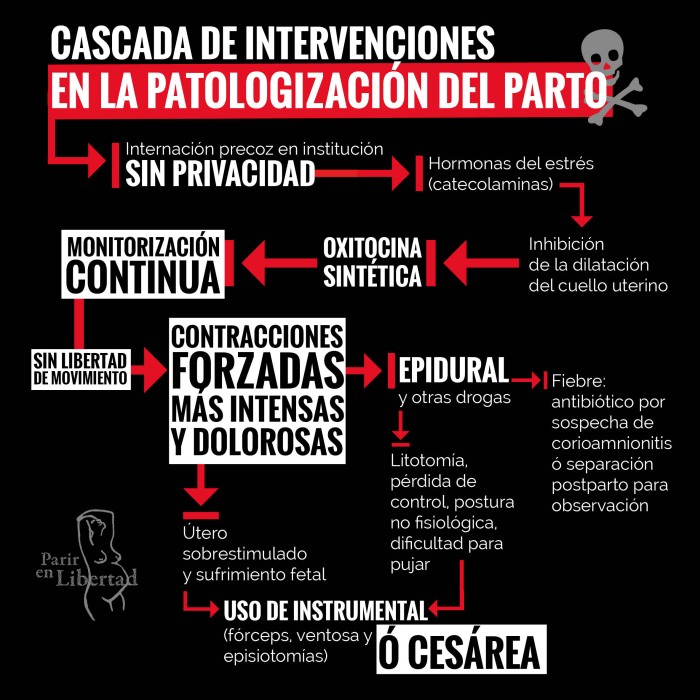
Nor will they be able to ignore, as has been done up to now, the neutral expert opinions that name the consequences that I continue to suffer today as a result of the treatment received and the traumatic experience. You will see in these expert reports that neither my baby’s life nor mine were in greater danger at home than in the hospital. In fact, I am not saying that there was no risk, because zero risk does not exist (in no house nor in any hospital). However, what these expert reports do state is that the prolonged pregnancy (and, if it had occurred, the home birth under these circumstances) presented few risks and, in any case, as many risks as the forced induction to which they wanted to submit me, skipping their own protocols by denying me the right to expectant management (foetal monitoring every 24 hours to verify that everything was still okay). This clearly shows that the arrogance of the obstetrician I ran into that day simply choked on my audacity to want to choose freely, as required by law. And this is obstetric violence.
Hence, I’m not giving up. I still have faith, although it won’t be in Spain, that some judge will end up agreeing with us. Simply because we are right. We are very close to winning this legal battle, we just need someone to do his job correctly. The law is on my side, we simply need, all of us, that it be applied. I will not tolerate that my experience serves for the Constitutional Court to allow obstetric violence to run rampant in this country and for rogue doctors to become all-powerful judges and, above all, in total impunity.
For this reason, 4 years after the events, after having exhausted national judicial resources, after having fought, having read every slander in the press, having exposed myself so much and invested so much energy in making visible the torture that my daughter and I have experienced, I ask for help. I ask for sorority, I ask for financial help, once again, to take my case to CEDAW. I am infinitely grateful for all the generosity you have already had, which has given me wings. Without you, none of this would have been possible. But we cannot give up here, so close to victory. I need you to take one more step. Not for me, I no longer have anything to gain or lose, but for my daughters, for all the people who, like me, have contributed to previous crowdfunding believing that some judge in this case would agree with us, for all of us, who have given birth or are yet to give it. So that no one else goes through this hell in total indifference. So that international bodies such as the UN remind our national institutions that they have obligations, that we have rights, that impunity does not exist and that women have a voice. To stop injustice. Because these last two sentences have been an insult towards women. To be able to give birth in freedom and free from prejudice.
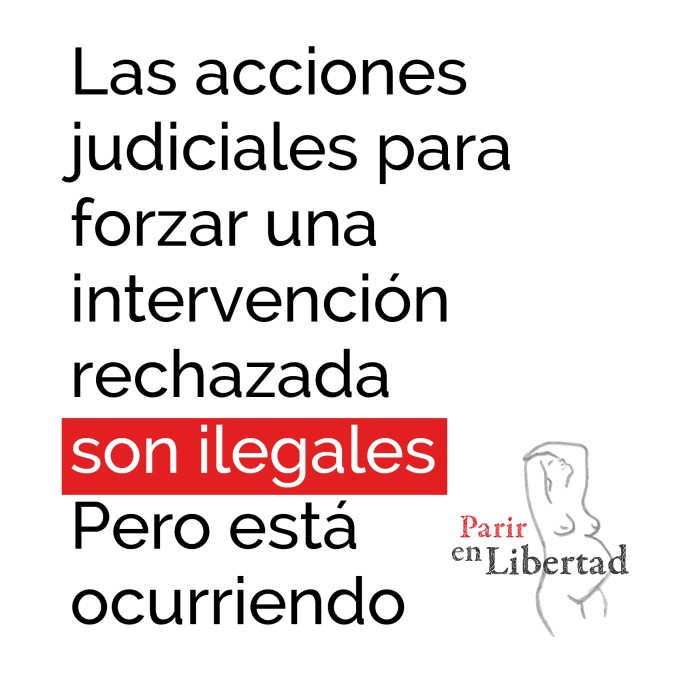
More information about the Oviedo case: https://www.parirenlibertad.org/caso-oviedo













